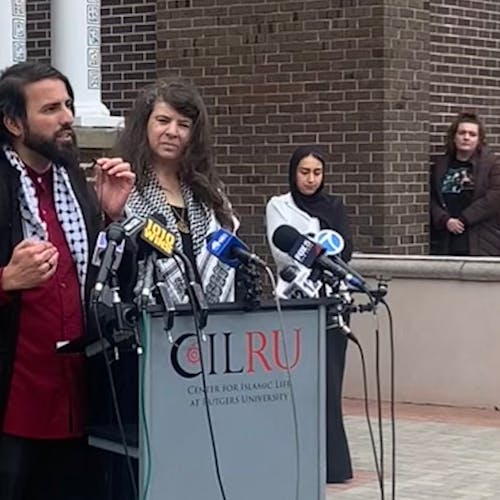Students debate Rice’s invitation

Rutgers University Student Assembly representatives voted 25-17 in favor of the Board of Governor’s decision to invite Condoleezza Rice to speak at this year’s commencement at last night’s meeting.
Prior to the vote, members of the Rutgers University Debate Union took on the issue of whether or not Rice’s invitation to speak at commencement should be rescinded.
Three weeks ago, University President Robert L. Barchi sent an email to the University community that said students and faculty should use these controversial moments to create an environment of civil discourse, said RUDU Coach Storey Clayton.
“We are here to embrace that mandate,” he said. “To consider, to discuss and to debate controversial issues.”
Clayton introduced the debaters and said their positions do not necessarily represent their own personal viewpoints. He added that debate serves as training to understand both sides of a given issue.
Arbi Llaveshi, a School of Arts and Sciences senior, spoke up first and said regardless of one’s personal beliefs, torture and war crimes are violations of human rights and of the functioning of a democracy.
Those are violations that went on under Rice, and Llaveshi said Rice pushed the idea that weapons of mass destruction were being developed in Iraq when Iraq’s nuclear program had been “dead for a decade.”
He said her administration ignored the United Nations when declaring war and said she was no better than a war criminal for her support of waterboarding as an interrogation technique.
On the other side of the debate, School of Arts and Sciences senior Diamler Vadlamuri, said the Rutgers community needs to focus on Rice’s accomplishments in American political history. Inviting such an accomplished woman to speak at commencement is an appropriate way to celebrate the achievements of Rutgers graduates.
Rice, one of the most influential and intellectual political figures of the last 50 years, managed to enact change as both the first African-American female secretary of state, he said.
Rutgers prides itself on being a liberal institution, Vadlamuri said, and restricting her speaking is not respecting free speech and academic freedom.
If the University were to rescind the invitation, Rutgers would not be remembered for all of its accomplishments, but instead as the university that rescinded the invitation for a former secretary of state to speak, he said.
Rachel Moon, a School of Arts and Sciences junior, contested Vadlamuri and said her side was not opposing Rice for her political affiliation or ideologies, but instead for her actions.
She is not against inviting a speaker with a viewpoint, but is against condoning a woman who hurt many people and mislead the American public about the presence of weapons of mass destruction in the Middle East.
A commencement speaker should be someone who inspired the graduates, and whose life has stood in line with the ethical codes that Rutgers encourages students to follow, Moon said. Bringing Rice to Rutgers and bestowing an honorary degree upon her is standing by what she’s done in the public sphere.
Deepta Janardhan, a School of Arts and Sciences senior, explained how any political leader that the University invites as commencement speaker would fail to have the full support of everyone.
If Rutgers were to rescind Rice’s invitation, the University would be remembered as the school that chose to invite Snooki to speak at an event, but revoke Rice’s.
Sean Leonard, vice president of RUDU, finished the debate in opposition of having Rice speak, questioning which political ideology says lying and torture are okay.
He also brought up the point that although civil discourse is good, the decision has already been made, and it is not democratic to have the opportunity to cry out without the option of change.
After the debate, RUSA representatives held their own debate. Pavel Sokolov, president of RUSA, introduced Joe Cashin and Sherif Ibrahim, who presented the two sides of the Rice debate.
Cashin, student representative to the Board of Governors, said he supports Rice as commencement speaker because she has had an accomplished career.
He said the faculty members do not want Rice to come to “chip away at Barchi” in order to make him look bad.
Rice will not be talking about her political ideologies, but instead will speak about overcoming adversity, said Cashin, School of Arts and Sciences senior.
“I am in favor of her coming to campus because most of the 2014’s [class] want her to come to campus,” he said.
Ibrahim, a graduate student at the University, opposed Rice as commencement speaker
Ibrahim said this is the most important thing he will ever vote on as a RUSA member.
“Do we really want to honor someone who was responsible for a war of choice and not a war of necessity?” he questioned.
RUSA proceeded to debate on whether or not they wanted to support either bill.
Cashin said the RUSA voting members should take a stand based on what their constituents believe.
Other RUSA members agreed and said as the student government of Rutgers, it is necessary to take a stand.
Jake Nieman, the University Affairs Committee chair, said if students do not take a stand, the faculty administration would be the only group talking about the issue, and since commencement is a student organization, they must take a stand.
This is an abbreviated version of the story. Check the full story on dailytargum.com.



